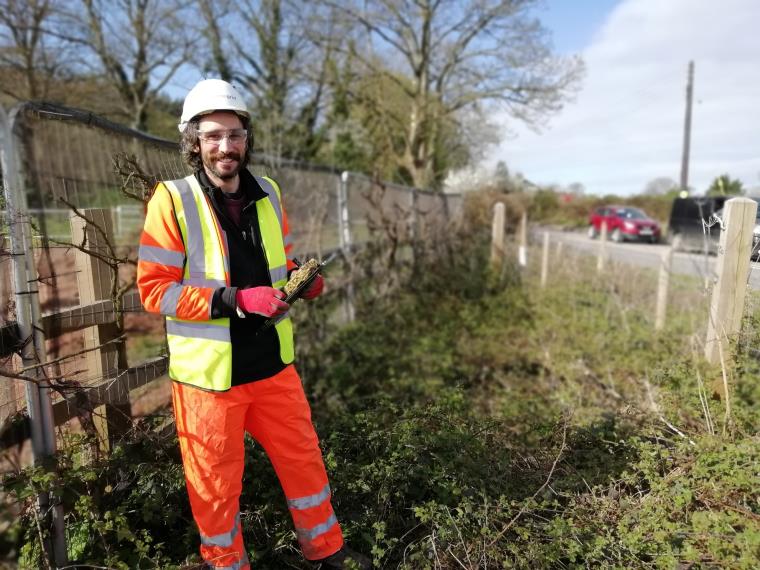Researchers team up with National Grid to research most effective ways to protect UK's bats

Researchers from the University of the West of England have partnered with National Grid to launch a unique project researching the most effective ways to mitigate construction impact on bats.
Bats are vital for maintaining the health of our ecosystems, yet mitigation work is often costly, time-consuming and its effectiveness is rarely tested.
The project will assess the effectiveness of bat flyway mitigation strategies and model bat habitat use within the North Somerset and Mendip Bats Special Area of Conservation (SAC) and the Mendip Limestone SAC. Findings will be applied on future major construction projects and used by local planning authorities across the UK.
PhD Project Lead Jack Hooker from UWE Bristol, said: “The focus of the project is on minimising the impacts of habitat fragmentation, where parts of a habitat are reduced and isolated, leaving behind smaller unconnected areas scattered across the landscape, which risks further loss of diversity and abundance of our wildlife.”
He added: “I want to come up with a fully-tested mitigation strategy that is cost efficient, time effective and easy to achieve, so that it’s a win-win for developers and the local wildlife.”
Between now and September, Jack will divide his time between the university and working on site monitoring bat flyways within the Mendip Hills Area of Outstanding Natural Beauty.
Project Director for National Grid, James Goode says: “Bat populations have suffered from declining numbers over the last century. To counter this and to mitigate the impact of our work in the area, we are already working hard to provide dedicated places for bats to roost and flyways to help them navigate.”
He added: “We hope our partnership with UWE Bristol will help to transform ways of working in the construction industry and help to protect the UK’s vulnerable bat populations for years to come.”
The project is being supervised by leading UK bat experts, Dr Emma Stone and Dr Paul Lintott, who are specialists in the academic areas of wildlife and human conflict, and assessing mitigation techniques.
Dr Lintott said: “This is an exciting opportunity for us to work with industry to ensure our research produces timely and useful applied outcomes. This innovative project will therefore provide greatly enhanced confidence that future conservation strategies for bats are cost-effective, reliable and evidence-based.”
Related news

10 February 2026
Work by UWE Bristol lecturer features in Government’s National Cancer Plan
Work by a UWE Bristol academic has been included in the Government’s National Cancer Plan.

23 January 2026
On-demand minibus services beneficial in rural areas but face financial challenges, trials suggest
Trials of ‘demand responsive transport’ minibus services boosted connectivity for people in rural and suburban areas, according to a new report produced by UWE Bristol researchers.

18 December 2025
UWE Bristol professor appointed National Institute for Health and Care Excellence CEO
Jonathan Benger CBE, Professor of Emergency Care at UWE Bristol, has been appointed as the new chief executive officer of the National Institute for Health and Care Excellence (NICE).

17 December 2025
Findings revealed from first UK study into experiences of mothers who are survivors of rape pregnancy
UWE Bristol academics have revealed the findings of the first UK-based study of the experiences of mothers who are survivors of rape pregnancy.

11 December 2025
Social media influencer work is far more demanding than it looks, research finds
A study exploring the mental health impacts of social media influencer work has revealed that life online is far more demanding than it appears.

25 November 2025
UWE Bristol experts join film Q&A exploring music and melodrama
Academics will take part in the Cary Comes Home Festival, with a post-screening Q&A exploring music, melodrama and emotional storytelling in classic cinema.

17 November 2025
Urgent reform needed to support ambulance-delivered end of life care, study finds
More than three quarters (78 per cent) of paramedics sometimes fear doing the wrong thing when caring for people in the last year of life, new research has found.

13 November 2025
Bristol’s screen industry experiences “boom-and-bust cycle” after post-pandemic recovery, new research from UWE Bristol finds
New research from UWE Bristol provides detailed insight into Bristol's screen sector.

13 November 2025
New AI research to revolutionise animal welfare
A UWE Bristol research project will combine behavioural science and AI to create technology that understands not only what animals do, but how they feel.

10 November 2025
Lessons from Low Traffic Neighbourhoods will drive better public engagement, study finds
Lessons from Low Traffic Neighbourhoods have informed a new toolkit to improve engagement with the public on challenging local street issues.

06 November 2025
First-of-its-kind study aims to help more people spend their final days at home
A new study will explore how architectural design could support end-of-life care in domestic settings.

29 October 2025
UWE Bristol academic unveils breakthrough in energy-efficient AI at NATO science forum
Dr Jonathan Lancelot has developed a new form of AI that could transform how intelligent machines operate in space, defence, and remote environments.






